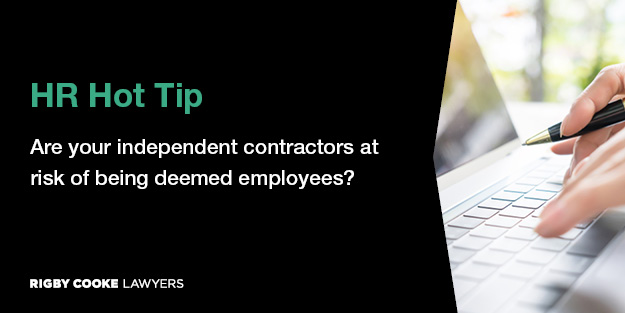Welcome to our series of HR interviews with Lawyer Monika Nosal who answers some of the most common questions asked by HR managers regarding employees’ legal entitlements.

Engaging independent contractors may seem attractive, particularly as independent contractors do not accrue leave entitlements, are not covered by modern awards (or enterprise agreements) and are not entitled to make unfair dismissal claims.
However, misclassifying a worker as an independent contractor when they are really an employee may lead to an employer becoming liable for superannuation and unpaid leave entitlements. In addition, the misclassification could also result in penalties being imposed on the organisation for breach of the National Employment Standards (NES), any applicable modern award or enterprise agreement and for engaging in ‘sham contracting’.
The test
There is no definite test to determine whether a worker is an independent contractor or an employee at common law. In order to determine whether a worker is an independent contractor or an employee, the Courts will look at a range of factors to ascertain the true nature of the relationship.
Some common factors considered include the following:
- the degree of control that an organisation exercises over how work is performed – the greater the control the more likely it is that the worker is an employee
- the hours of work – standard and set hours usually indicate that the worker is an employee
- expectation of work – if the work is ongoing it is more likely that the worker is an employee
- the ability to delegate work to others under their control outside the organisation – a worker who is free to delegate work to others is more likely to be a contractor
- provision of equipment and tools – a worker who is responsible for providing their own equipment is more likely to be a contractor
- representations to customers/clients and the public – a worker having a connection with an organisation (e.g. by wearing a uniform with the organisation’s logo) is more likely to be an employee
- the method of payment – a worker that holds an ABN and submits invoices for work completed is more likely to be a contractor.
Employers obligations under the NES, modern awards, enterprise agreements and contracts can be complex, overlapping, and at times confusing.
Employers need to familiarise themselves with and understand their legal obligations to avoid any possible claims by employees (both existing and former) and unsuccessful job applicants, as well as prosecution by the Fair Work Ombudsman. Under the accessorial liability provisions of the Fair Work Act 2009 (Cth), employers and individuals such as directors and HR managers can be personally held accountable for breaching workplace laws in certain circumstances.
A HR Legal Audit conducted by Rigby Cooke can provide the HR function and, in turn, provide employers with comfort in knowing that they are legally compliant, or at least provide advance warning of any potential compliancy issues before they become problematic.
| Disclaimer: This publication contains comments of a general nature only and is provided as an information service. It is not intended to be relied upon as, nor is it a substitute for specific professional advice. No responsibility can be accepted by Rigby Cooke Lawyers or the authors for loss occasioned to any person doing anything as a result of any material in this publication.
Liability limited by a scheme approved under Professional Standards Legislation. ©2021 Rigby Cooke Lawyers |
